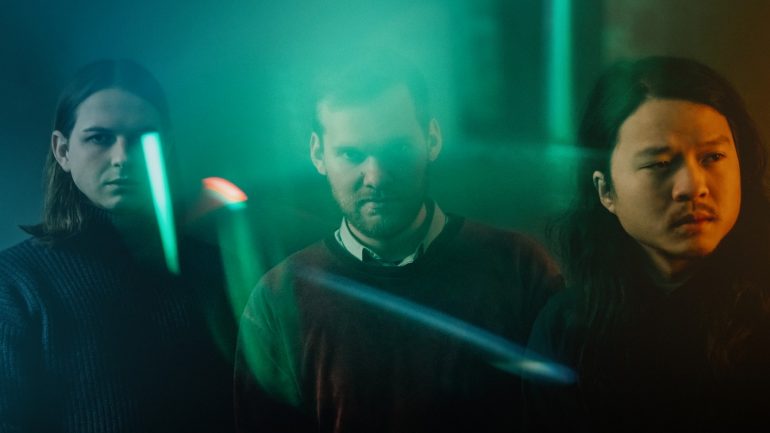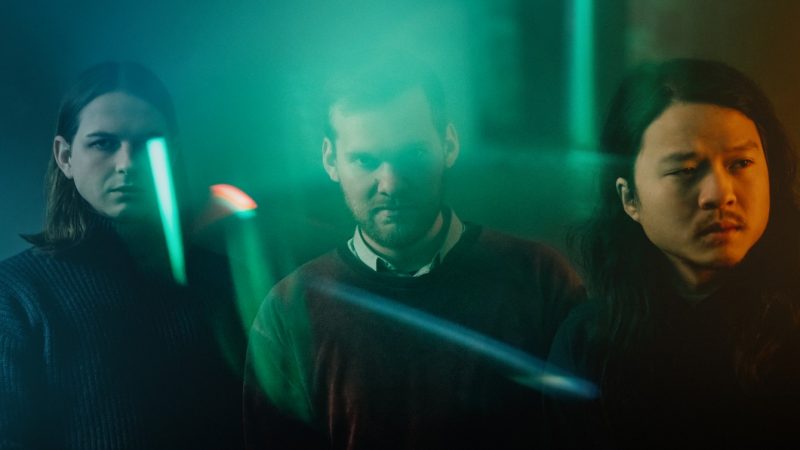
Photo by Robert Winter
An early vanguard of summer accompanies me on my way through the streets of Haldern, a small village situated in the middle of the Rhineland, tiny from the viewpoint of a townsman, but important enough to warrant a station. The 17th of May is an exceptionally warm day for both the region in general and this time of year in particular, and I find myself wondering if any people are going to undertake an hour-long ride on a weekday to attend a concert in a location this remote. It’s not like it would be the first time: the Haldern Pop Bar, a spin-off of the renowned Haldern Pop Festival, has managed to pull sizable crowds from the region for years, nurturing a schedule of independent, predominantly rock- and folk-oriented acts in a music-starved area.
Furthermore, the occasion is a special one: it’s the first concert of Cologne-based pop band WOMAN since the release of their debut album Happy Freedom. Though infused with the DNA of 40 years of rock, funk, electronica and pop music, the comparisons with acts like JUSTIN TIMBERLAKE only scratch at the surface of their style, especially on their debut LP with its nod to the sounds of the 70s and 80s. Curious to find out WOMAN‘s thoughts on some of these comparisons, I brought some songs with me with the intent to play them to the band. As I arrive at the venue, I encounter the band outside enjoying the sunny weather. The atmosphere is cheery – WOMAN have just completed their soundcheck and are about to enjoy their dinner on a sunlit balcony overlooking a quiet garden.
The way the three musicians present themselves is not too dissimilar of the vibes that permeate the band’s work on Happy Freedom and the EP that preceded it. Though obviously the work of artists with a broad horizon, they retain the insouciance indicative of unashamed pop. However, it took the band quite a bit of time and soul-searching to arrive at that point. ‘After a gig at [now defunct, A/N] klubgenau in 2013, we locked ourselves in and tried to write a song properly. We worked an entire month on a track we butchered by overthinking it, which led to a kind of crisis’, recounts drummer Milan. At that point, WOMAN were a three-piece consisting of Manuel Tran, Milan Jacobi and Marvin Horsch. ‘The solution was to invite Carlos in.’
‘During that phase with Pharrell Williams, he tried to break away from this boy band garbage and he has a really good voice. I don’t have anything against him personally and his recent song is awfully catchy, but it’s nothing I’d put on at home.’ – Carlos
Things seemed to be working well for WOMAN – for a gig with XUL ZOLAR in 2014, they brought the big guns, entering the stage with a seven-piece lineup. Although the show went well, lethargy and aimlessness set in afterwards, and founding member Horsch decided to call it quits as he aimed to move away from band-oriented music. It turned out to be a turning point, as the remaining three members were eager to take on the challenge and move into new territory setup-wise. In the meantime, the band’s demos had taken a life of their own, finding their way to BILDERBUCH producer Zebo Adam. ‘We never pro-actively sought for a producer – we always assumed we were skilled enough to handle production ourselves’, remembers Carlos.
‘Zebo Adam liked what he heard so he visited us at our rehearsal space, slept at our flat and attended our gig at c/o pop Festival. We had hung out for a day and after one and a half hours, everything was set. We got along very well on a personal level, which was very important to us.’
‘A very majestic song. With that song, they seem to be moving back towards their second album. It’s a bit more intricate than Shields, which was very poppy and big.’ – Milan
Ultimately, having Adam on board helped WOMAN work through the insecurities and challenges of writing and recording an album from scratch. Not only did Adam’s long-time experience prove to be an invaluable asset to the band as he served as an advisor, initiator and mediator to the band – he also acted as a source of mental support, taking the band members by the hand or pushing them in a different direction if necessary. ‘It’s always good to have one more person on board that is not as emotionally invested in the music’, explains Manuel. ‘He was able to shield us during a time of production and songwriting and serve as a wall to the outside world, which is a big strength of his’, adds Milan. ‘Basically, we handed over responsibility to him, which relieved quite a bit of pressure’, concludes Manuel.
‘Of course we had arguments with him over songs, but someone who hasn’t written the music has a completely different viewpoint on what we try to convey. When you work on a song for days on end, you end up losing the essence of the track. That’s where Zebo comes in and says ‘Hey, that was good already, don’t worry too much about it!’
‘I found it strong because it was very courageous. I read an interview with BILDERBUCH, and there was this accusation that it was supposed to sound like FRANK OCEAN alone with his laptop, but then there’s BEYONCÉ and CHANCE THE RAPPER. Of course it is a mass product, but it appealed to me on an emotional level where many R&B albums didn’t touch me.’ – Carlos
The constant emotional limbo WOMAN experienced during their three-month-long recording sessions inspired them to assume a different perspective thematically. Political themes seeped in the songs, which ‘can be understood on a micro and a macro level’, as Milan describes. ‘Essentially, it’s all told from our perspective, but it’s not only about us’, adds Manuel. ‘We have a chance and a responsibility with everybody who listens to our music. The issues we address on the album are the same as 30 years ago, but nobody talks about them – there’s a void in today’s music.’ It seems to be a recurring problem with pop music, as Carlos thinks:
‘Popular music has always struggled with treating serious topics in an approachable manner. It’s a tightrope act to provide entertainment with substance in a way that is neither bold nor crude and we tried to find a middle ground.’
When I put on RADIOHEAD’s The Numbers, a song that might be understood as an unlikely anthem of empowerment, Carlos notes how the band’s complexity is what today’s pop music is missing. ‘I can’t believe that there are so little other bands that inspire people to open up forums and exchange views on music over thousands of pages.’ However, as Manuel explains, ‘we’re happy that others in Cologne have finally realized that we’re a generation of musicians that could make a difference. It’s about not playing it safe, but doing something that will provoke some people.’
‘An incredibly talented young musician who combines electronic music and jazz in a way that doesn’t sound at all like jazz from a music academy.’ – Carlos
The band’s distaste for beaten paths does not limit itself to lyrical content though. As we discuss GIANNI BREZZO’s take on jazz music, I stumble over Carlos and Milan’s withering assessment of German music academy landscape and its output of middle-of-the-road pop music, which was recently parodied by German satirist and late-night show host Jan Böhmermann to huge media response. ‘It’s all very ‘correct’. Especially bands that sing in German tend to sound as if they all came from the same music academy. I feel like with German pop music, there is often a recipe to success’, criticises Milan. Carlos would have loved to have access to professional education, but even he knows:
‘You cannot go to a university to study politics, copy the opinion of your international studies professor and think that it is your own. You need to form an opinion, but unfortunately that happens too seldom.’
In their eyes, it’s the system’s narrow-mindedness and reluctance to deviate that spawns what Carlos calls ‘buzzword-laden hashtag music’. There’s a sense of respect for its listeners, who might be genuinely moved by what they hear; WOMAN’s disgust, however, is directed at its creators. As Manuel recounts the story of a songwriter who claims he can write a hit in five minutes, Carlos immediately chimes in: ‘How much substance does that song have? How much substance could it possibly have?’ Given the context, it sounds like a call to action.



